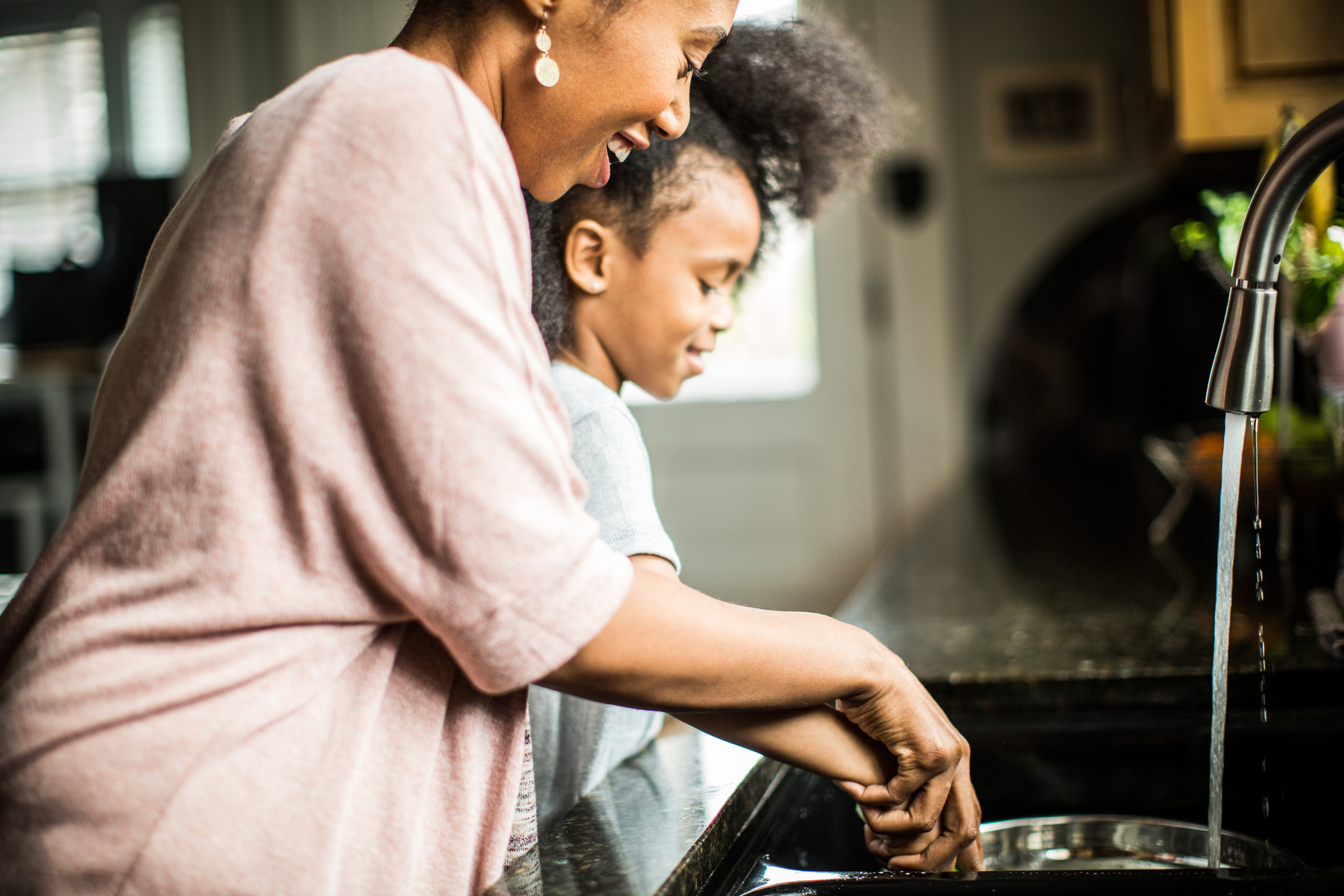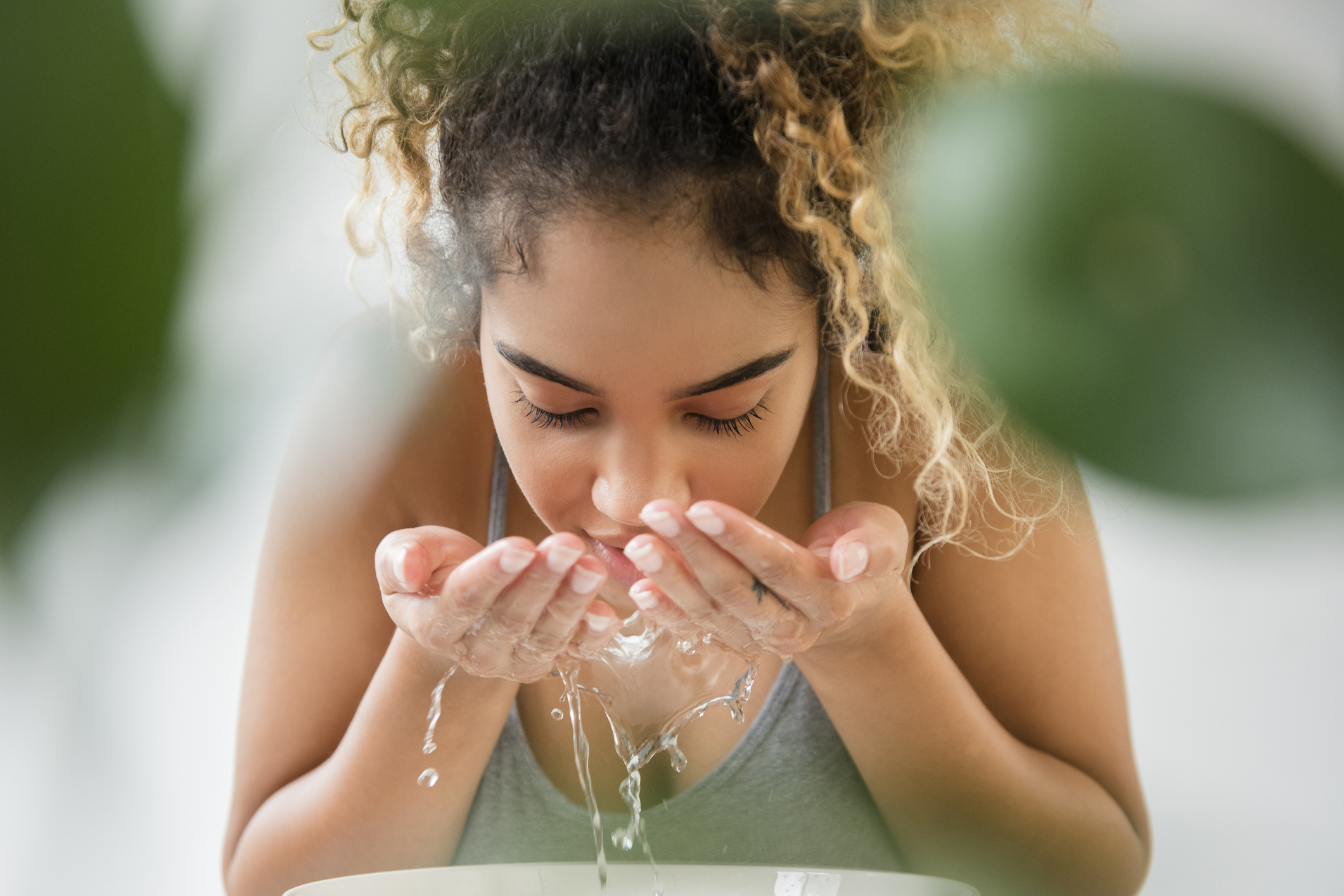
Celebrity news, beauty, fashion advice, and fascinating features, delivered straight to your inbox!
You are now subscribed
Your newsletter sign-up was successful
The Environment Agency has issued warnings about UK water shortages by 2050—here's how to take action.
If you've Googled, 'how do I reduce my water usage?', chances are, you're aware that it's a scarce commodity - and one that we need to be using less of.
Case in point - the sheer scale of British water consumption from laundry alone has been revealed in a new study.
Up to 360 billion litres of water go down the drain each year from UK washing machines, according to new findings from Oxwash. To put that into perspective for you, that's the equivalent of draining Windermere, England's largest natural lake, of its 300 billion litres of water.
With approximately 19.2 million families in the UK, every year, each family is thought to be using up to 450 billion litres of water.
This comes as the Environment Agency begins to issue warnings that the UK could see significant and impactful water shortages by 2050 if conservation action is not taken—and soon.
Just like reducing your carbon footprint, reading up on greenwashing and trying to make your periods more sustainable, it's time to take action. Let this practical, expert-led guide teach you the simple ways you can reduce your water usage generally, as well as at home.
Celebrity news, beauty, fashion advice, and fascinating features, delivered straight to your inbox!
So, how do I reduce my water usage?
Why is water a scarce–and important—commodity?
According to World Wildlife, although water covers 70% of our planet, only 3% of that water is fresh and accessible. "Fresh water is needed to fuel ecosystems, agriculture and feed the human population and, unfortunately, that figure is only decreasing," shares doctor Kyle Grant, founder of Oxwash.
Why? Well, simply as our waterways are suffering more and more pollution, or are drying up as a result of the earth getting hotter, he shares.
Shannon Houde, founder and managing director of Walk of Life Coaching and author of Good Work: How to Build a Career that Makes a Difference in the World agrees, further adding that of the 3% of the world's fresh water, only 0.5% is actually drinkable. "That in itself shows you how vital it is to conserve the water we do have, particularly when you factor in rapid population growth."
That is, the millions of people globally who, each year, need and rely on water to drink, wash, grow food and essentially live. "Pair that with the fact there is no change to the volume of water actually available and you've got a recipe for scarcity," she shares.

Do we use too much water in the UK?
Did you know? In the UK, every person uses approximately 150 litres of drinkable water a day, according to doctor Grant. "That's 55% more water than we used in 1980," shares Houde.
The UK uses more than Denmark, who use 80 litres per person, but far less than the USA, where they use 370 litres per person per day.
So what so much water?
- Showers, lavatories, baths and bathroom sinks consume more than two-thirds (68%) of household water, according to Energy Saving Trust (EST).
- Washing your clothes accounts for 13% of usage per day, as per Oxwash stats.
Sadly, the bad news is, most people have no idea how they're using quite so much water. "Forty-six per cent of people believe their household uses less than 20 litres a day," shares Houde.
In reality, the average UK household uses 349 litres of water per day, according to the EST. Just let that sink in for a second.
Why is it essential we evaluate (and reduce) our water usage?
Because, in short, we need it to survive, and we're running out the supplies. Just like reducing your plastic consumption and opting for sustainable living more generally, it's something we all have a responsibility to read up—and start acting—on.
"The stress on the UK’s water supply is already vast," shares doctor Grant. "The demand for fresh water is higher than the rate of supply, and this can only be slowed down by reducing the wastage of water."
Think of it this way: already billions of people around the world struggle to get access to safe, clean water, while at the same time households in the UK waste litres and litres of it without a second thought, shares Houde.
"We all need to do our bit to change that. No, it isn’t quite as simple as turning off a tap in one country and watching it flow to another continent, but, by being more mindful about reducing our own water usage, we can start to change the narrative," she shares.
7 ways you can reduce your water usage generally
Know this: you may think you can’t make a dent in how much water an entire country uses. "But every action, and every person, counts. Try these easy practical steps to start reducing your own water usage," shares Houde.
1. Check the water efficiency of household items
Did you know that when buying a new dishwasher, washing machine or even toilet, you can check its water efficiency?
"If you can see a tap symbol in the product specification, this will tell you the water consumption figure, and how much water the appliance is likely to use over the course of a year," shares doctor Grant.
2. Think twice about whether or not you need to wash your clothes
In a recent YouGov survey conducted by Oxwash, one in ten (10%) people admitted to washing their towels after every use, while 5% said they put their jeans in for a cycle after one wear.
"Clothes like denim, sweaters and jackets can be worn multiple times before they need to be washed again," doctor Grant shares.
3. Be conscious about the water you use outside your home, too
Another interesting fact: loads of you are guilty of leaving a sprinkler or a hosepipe running in your garden for hours on end (we've done it too). "This can waste between 500 and 1,000 litres of water an hour," shares doctor Grant.
By switching to a watering can, you can better control and limit the water used, ensuring you are only watering what is needed. Remember—small changes make all the difference.
4. Switch to more sustainable washing solutions
Take Oxwash, for example, which recycles water between washes and saves up to 60% of the water consumption of a typical commercial appliance. Opting for sustainable washing products, like smol and Bower Collective, will also save wasted water in the supply chain.
5. Check for leaks
Leaks are one of the major reasons water gets wasted, shares Houde. "Ask a plumber to come and do a full audit of your house to check for leaks, and make sure they check pipes, faucets, and toilets," she recommends.
6. Turn off the tap
Sounds obvious, but you'd be amazed by how many people don't do it. "Make it a priority to turn off the tap when you brush your teeth, shave, clean veggies, wash your hands or wash the car – it's vital," explains Houde.
7. Think about when you're watering your garden
And finally, on the gardening front again, it's worth thinking about the time of day you choose to water your plants.
Best practice on the water front? "Only water the garden during the coolest parts of the day and deep soak your plants so that the water goes into the roots."
Another top tip from Houde: only water it when it doesn’t spring back up when you step on it.
So there you have it: reducing your water usage never looked so simple.

Ally is Marie Claire UK's Senior Health and Sustainability Editor, a well-regarded wellness expert, ten-time marathoner, and Boston Qualifying runner.
Utilising her impressive skillset and exceptional quality of writing, she pens investigative, review and first-person pieces that consistently demonstrate flair and originality.
As well as writing, Ally manages a team of freelancers, oversees all commissioning and strategy for her pillars, and spearheads the brand's annual Women in Sport covers, interviewing and shooting the likes of Mary Earps, Millie Bright, and Ilona Maher. Shortlisted for three BSMEs and winning one in 2022, Ally lives and breathes her verticals: her eye for a story and connections within the wellness sphere are unrivalled. Follow Ally on Instagram for more.
